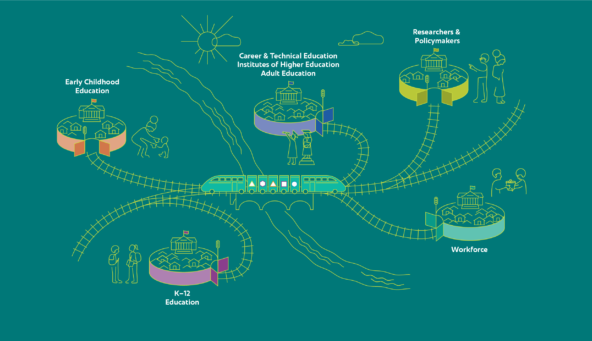Illuminations and Insights
We shine a light on our partners, the work we've done across the country, and insights from our team members.
Filter
- See All
- About EA
- Analyst
- Artificial Intelligence (AI)
- Attendance
- COVID-19
- Data Engineering
- Data Privacy & Security
- Data Systems
- Data Visualization & Dashboards
- DEI
- Educator Effectiveness
- ESSA
- Future Forward
- Interoperability
- Research
- Social Emotional Learning
- Student Growth Measures
- User-Centered Design
- Product Development

Five Things We Learned at SXSW EDU
From March 3 - 7, several Education Analytics’ staff had the opportunity to attend and present at SXSW EDU in Austin, TX. CEO Andrew Rice and EA Board President Richard Bowman (Chief Information and Strategy Officer at Albuquerque Public Schools) presented the session, “Data Interoperability & AI: Veggies Before Dessert.” Also in attendance at SXSW EDU was Development Strategist Ben Dederich, Director of Brand & Communications Marlena Holden, and Chief of Staff Libby Pier. In this blog, the group reflects on their time at SXSW EDU and highlights their key takeaways from the conference.
The Path Forward for AI in Education
The release of generative AI tools like ChatGPT has unleashed innumerable possibilities for new interfaces between computers and human experts (like teachers), where the algorithm is not just reporting information, but can instead act like a superpowered assistant. Although AI models have the potential to provide valuable insights at a low-cost to educators, challenges remain when applying these models to the education sector due to privacy concerns and data infrastructure barriers. In this blog, EA’s CEO Andrew Rice describes the importance of training AI models using specific contextual data and proposes a public-interest driven AI strategy that uses common data surfaces, prioritizes non-commercial infrastructures, and empowers educators to leverage AI tools while safeguarding privacy and avoiding commercial exploitation.

10 research questions interoperability will radically transform
Data interoperability is poised to radically transform educational research by making work with educational data less costly but more efficient, scalable, and actionable. In our latest blog, EA’s CEO Andrew Rice highlights 10 questions that researchers could answer more meaningfully, more accurately, and more quickly when using interoperable data streams. The blog describes how interoperability is on the cusp of revolutionizing educational research by effortlessly bringing together data from different sources, allowing statistical research outputs to live in real time, and turning rigorous research into actionable, operational systems for educators.

From datasets to data streams: How we can move the education field away from being data rich but information poor
At EA, we believe that deep integration of education research and technology has the power to create a new breed of modern, data-centric education organizations capable of achieving breakthrough student outcomes. But this integration requires the field of education research to catch up to the advances of modern technology, and the technology field to apply research-grade thinking to how we build and scale technology. In this blog, we propose that to achieve this integration, we need to replace the concept of a dataset with a data stream, and we examine this challenge from the perspective of education researchers and from technologists.

A collaborative state strategy for SLDS 2.0: A call to action
20 years of technology development and large-scale implementation of Statewide Longitudinal Data Systems (SLDS) have generated a wealth of knowledge, strategies, and successes, which will be invaluable to the next phase of SLDS work. In this blog, EA's CEO Andrew Rice lays out a vision for a collaborative state strategy for the next generation of SLDS that leverages the idea of a reference software build. The blog summarizes the policy and technological trends that have brought us to the field's current state and proposes a collaborative strategy to realize the promise and potential of the next version of SLDS.

Data neighborhoods: Preserving context around educational data
In this blog, we establish core principles for conceptualizing data interoperability as transport, including how decentralized governance models enable local control over data in ways that maximize privacy and security. We introduce the concept of "data neighborhoods" as a metaphor for this interoperability model, and we connect different kinds of context around educational data to the core principles.